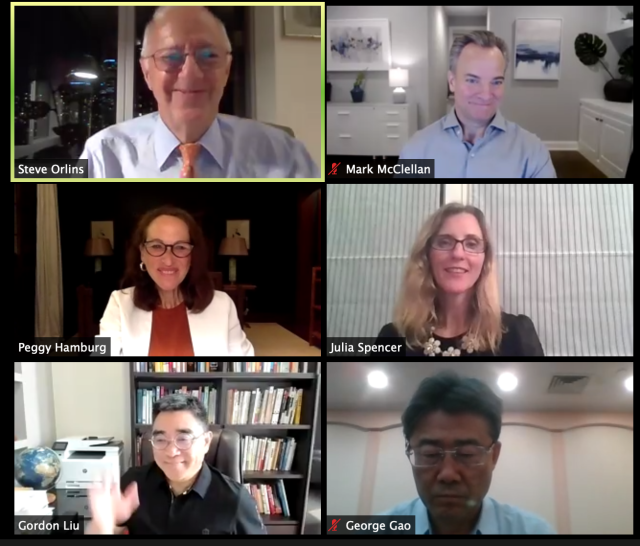
The raging of COVID-19 in 2020 is threatening the lives and health of people all over the world. That makes it necessary for China and the United States to cooperate to fight the pandemic and overcome the difficulties.
In this context, on the morning of July 31, 2020, top experts from China and the United States invited by the National Committee on U.S.-China relations and National School of Development at Peking University launched a special public event——US-China Track II Dialogue on Healthcare, entitled “Enlightenment from the pandemic outbreak: how China and the United States can work together in the global health crisis”, discussing in depth the public health reform, quarantine policy and health care supply.

Present at the dialogue were Chinese and American experts including Professor Gordon Liu, Director of the Academic Committee of National School of Development and Director of China Center for Health Economic Research at Peking University, George Gao, Director of the Chinese Center for Disease Control and Prevention, Margaret Hamburg, Foreign Secretary of the National Academy of Medicine and former commissioner of the US Food and Drug Administration (FDA), Mark McClellan, director and Robert J. Margolis , M.D., Professor of Business, Medicine Health Policy at the Margolis Center for Health Policy at Duke University, and Julia Spencer, Associate Vice President of Global Vaccine Public Policy and Government Affairs at Merck KGaA. The dialogue was presided over by Steve Orlins, Chairman of the National Committee on U.S.-China Relations.
After reviewing the stringent national control measures taken by China to fight the COVID-19 outbreak, Professor Gordon Liu analyzed how cultural differences affected the anti-pandemic action and effect in different countries, and introduced the important role of China's public hospitals with advantages in combating the pandemic. Then, he proposed two considerations. One is how to improve the cost effectiveness of epidemic prevention and control. It may not be cost-effective to centralize all patients for hospital treatment, as problems of sustainability will occur, and a large number of human and property resources of primary medical institutions will be idle. The other is how to balance the allocation efficiency of medical resources and social welfare, so that the hospital won’t delay the treatment of patients with other diseases while combating the COVID-19 outbreak. Professor Gordon Liu appealed for meeting, talks and discussion by the governments of China and the United States to form a more transparent action guide easy to follow and implement, so as to advance together and boost global cooperation.
George Gao, Director of the Chinese Center for Disease Control and Prevention, provided the snapshot of China's efforts and major measures amid the COVID-19 outbreak, and said that one of the challenges at present is how to ensure that all people can be given the COVID-19 vaccine, especially how to provide funds for people in needy areas to give vaccines to more people. He highlighted that the Chinese and American governments need to strengthen cooperation to jointly fight the pandemic.
Margaret Hamburg, Secretary of Foreign Affairs of the National Academy of Medicine and former Director of the US Food and Drug Administration, thinks that an important issue facing the United States is how to lower the infection rate and cut the transmission chain. In her view, the US government responded to the pandemic sluggishly in the early stage, and it failed to formulate a unified national anti-epidemic plan in time, or to mobilize the resources of the government, public health and scientific institutions. The United States needs to learn from China and other Asian countries. She also calls for concerted efforts among countries and preparation for a long-term fight against the pandemic.
Robert J. Margolis, Chair Professor of Business and Medical Health Policy at Duke University, and Mark McClellan, former Director of the U.S. Food and Drug Administration, still advocate the necessity of Sino-US dialogues despite increasingly tense current Sino-US relations as we are in the unprecedented global public health crisis. In their view, China and the United States should carry out exchanges and cooperation in anti-epidemic measures, progress in treatment and improvement of medical and health services.
Julia Spencer, Vice President of Global Vaccine Public Policy and Government Affairs, Merck KGaA, said that the research & development of the covid-19 vaccine is progressing at an ever higher speed, and that international cooperation and early participation of regulatory agencies, enterprises and other relevant institutions are vital in the accelerated development and future deployment of the pandemic vaccine. She highlighted that availability of vaccines is only one aspect of the solution, and what’s more critical is to build public trust in vaccines and their systems.
After their speeches, the four experts launched in-depth dialogues and answered questions from the online audience.
As one of the supporting activities of the mechanism of “people to people exchange between China and the United States”, the “Sino-US Track II Dialogue on Health” starting in 2017, organized by the National Committee on U.S.-China Relations and National School of Development at Peking University, is held once a year and alternately in China and the United States. During the event, representatives from the political, business and academic circles of the two countries have frank and in-depth dialogues and exchanges and reach a certain consensus on relevant topics in the medical and health field of both countries. The results of the dialogue will be reported to the relevant departments of the two countries for reference in both governments' decision-making. This is the first online event.